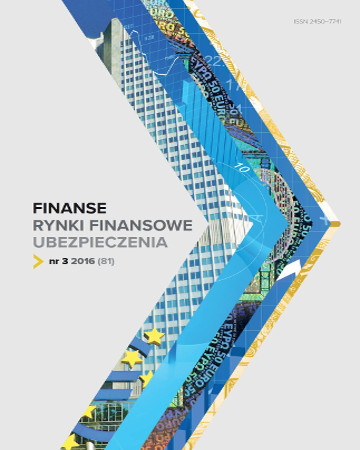
ISSN: 2450-7741
OAI
DOI: 10.18276/frfu.2018.92-41


Issue archive /
2/2018 (92)
Federalizm fiskalny – wady i zalety
(FISCAL FEDERALISM – ADVANTAGES AND DISADVANTAGES)
| Authors: |
Barbara
Wieliczko
Instytut Ekonomiki Rolnictwa i Gospodarki Żywnościowej |
| Keywords: | fiscal federalism decentralization impact on economic growth. |
| Data publikacji całości: | 2018 |
| Page range: | 8 (477-484) |
| Klasyfikacja JEL: | H77 H71 H72 |
Abstract
Purpose – The aim of the article is to present the state of current knowledge concerning the advantages and disadvantages of fiscal federalism. The recent global financial crisis was an impulse to verify the current assessment of these advantages and disadvantages.
Design/methodology/approach – The article is based on a review of literature on the subject of fiscal federalism.
Findings – The conclusions stemming from this review indicate that the advantages exceed the disadvantages only when fiscal federalism is implemented in conditions of a well-functioning institutional system and when there is an effective mechanism for supporting the poorest regions by others, i.e. a mechanism of redistribution.
Originality/value – The paper enables getting acquainted with the results of the current arrangements regarding the balance of costs and benefits of using fiscal federalism, which is a voice in the discussion on the advantages and disadvantages of increasing the autonomy of regions in the implementation of state or EU tasks.
Download file
Article file
Bibliography
| 1. | Asatryan, Z., Feld, L.P. (2013). Revisiting the Link Between Growth And FEDERALISM: A Bayesian MODEL AVERAGING APPROACH. ZEW Discussion Papers, 13-049. |
| 2. | Baskaran, T., Feld, L.P., Schnellenbach, J. (2014). Fiscal Federalism, Decentralization and Economic Growth: Survey and Meta-Analysis. Center for Economic Studies & Ifo Institute Working Paper, 4985. |
| 3. | Boadway, R., Tremblay, J.F. (2012). Reassessment of the Tiebout Model. Journal of Public Economics, 96, 1063–1078. |
| 4. | Brooks, J.R. (2014). Fiscal Federalism as Risk-Sharing: The Insurance Role of Redistributive Taxation. Tax Law Review, 68, 89–142. |
| 5. | Brueckner, J.K. (2006). Fiscal Federalism and Economic Growth. Journal of Public Economics, 90, 2107–2120. |
| 6. | Droste, N., Becker, C., Ring, I., Santos, R. (2017). Decentralization Effects in Ecological Fiscal Transfers: A Bayesian Structural Time Series Analysis for Portugal. UFZ Discussion Papers, 3. |
| 7. | Ezcurra, R, Pascual, P. (2008). Fiscal Decentralization and Regional Disparities: Evidence from Several European Union Countries. Environment and Planning A, 40, 1185–1201. |
| 8. | Evers, M.P. (2015). Fiscal federalism and monetary unions: A quantitative assessment. Journal of International Economics, 97, 59–75. |
| 9. | Feld, L.P. (2014). James Buchanan’s Theory of Federalism: From Fiscal Equity to the Ideal Political Order. Freiburger Diskussionspapiere zur Ordnungsökonomik, 14/06. |
| 10. | Hatfield, J.W. (2015). Federalism, Taxation, and Economic Growth. Journal of Urban Economics, 87, 114–125. |
| 11. | Kessler, A., Lessmann, C. (2009). Interregional Redistribution and Regional Disparities: How Equalization Does (Not) Work. Pobrano z: http://www.sfu.ca/~akessler/wp/disparities.pdf. |
| 12. | Kyriacou, A.P., Muinelo-Gallo, L., Roca-Sagalés, O. (2015). Regional Inequalities, Fiscal Decentralization and Government Quality: Empirical Evidence from Simultaneous Equations. Governance and Economics Research Network Working Paper, A 2015 – 1. |
| 13. | Lessmann, C. (2009). Fiscal Decentralization and Regional Disparity: Evidence from Crosssection and Panel Data. Environment and Planning A, 41, 2455–2473. |
| 14. | Liu, L., Ding, D., He, J. (2017). Fiscal Decentralization, Economic Growth, and Haze Pollution Decoupling Effects: A Simple Model and Evidence from China. Computational Economics. Pobbrano z: https://doi.org/10.1007/s10614-017-9700-x. |
| 15. | Oates, W.E. (1999). An Essay on Fiscal Federalism. Journal of Economic Literature, XXXVZZ, 1120–1149. |
| 16. | OECD (2016). Fiscal Federalism 2016. Making Decentralisation Work. Paris: OECD Publishing. |
| 17. | Rodríguez-Pose, A., Ezcurra, R. (2010). Is Fiscal Decentralization Harmful for Economic Growth? Evidence from the OECD Countries. Spatial Economics Research Centre Discussion Paper, 0051. |
| 18. | Sharma, C.K. (2012). Beyond Gaps and Imbalances: Re-Structuring the Debate on Intergovernmental Fiscal Relations. Public Administration, 90, 99–128. |
| 19. | Sorens, J. (2014). Does Fiscal Federalism Promote Regional Inequality? An Empirical Analysis of the OECD, 1980–2005. Regional Studies, 48, 239–253. |
| 20. | Tsebelis, G. (2002). Veto Players: How Political Institutions Work. Princeton: Princeton University Press. |
| 21. | Tu, B., Tao, X., Guo, N. (2017). Understanding Governmental Spending on Public Cultural Services: Exploring the Effects of Fiscal Decentralization. Theoretical Economics Letters, 7, 709–727. |
| 22. | Weingast, B.R. (2014). Second Generation Fiscal Federalism: Political Aspects of Decentralization and Economic Development. World Development, 53, 14–25. |
| 23. | Yushkov, A. (2015). Fiscal Decentralization and Regional Economic Growth: Theory, Empirics, and the Russian Experience. Russian Journal of Economics, 1, 404–418. |